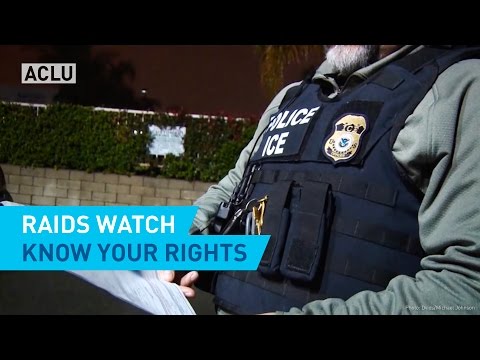ICE Agents At Your Door
You are not legally required to let them in unless they have a warrant.
Ask why they are there.
If you don’t speak English, you have the right to an interpreter.
If they want to enter, ask to see a warrant.
There are two kinds of warrants: search and arrest.
- A search warrant allows police to enter the address listed on the warrant, but officers can only search the areas and for the items listed.
- An arrest warrant allows police to enter the home of the person listed on the warrant if they believe the person listed is inside. A warrant of removal/deportation (ICE warrant) does not allow officers to enter a home without consent.


Privacy statement. This embed will serve content from youtube.com.
Ask the officer to slip the warrant under the door or hold it up to the window, so you can inspect it.
They might show administrative forms (I-200 and I-205). But if they don’t have a warrant signed by a judge, you may refuse entry.
Check for signature by judge.
- If it's a search warrant, make sure it is for your address; if not, you don’t have to open.
- If it's an arrest warrant, make sure it is for someone who lives at your address; if not, you don’t have to open.
Even if officers have a warrant and you have to let them in, you have the right to remain silent.
Say: “I plead the Fifth Amendment and choose to remain silent.”
If they force their way inside, don’t resist.
Remain calm, but don’t share any information.
If you’re arrested, remain silent.
You’re entitled to speak to a lawyer before cooperating and most importantly, keep calm because YOU HAVE RIGHTS, EXERCISE THEM.
If ICE is at your workplace:
Do NOT consent.
State that you do not consent to a search. ICE can enter areas open to the general public (dining area, parking lot, waiting room) of a business without permission. But that does not give ICE the authority to detain, question, or arrest anyone.
Ask if they have a warrant.
If agents don't have a warrant, calmly ask them to leave. Advise workers that they have the right to remain silent and do not have to answer questions, but do not direct anyone not to answer questions.
If ICE has a SEARCH warrant signed by a judge:
Make sure the warrant has the correct address for your workplace. Review the warrant to see what areas and items ICE is authorized to search. ICE is not authorized to search areas or inspect items that are not described in the warrant.
Stay calm.
Do not run, ICE can use that as a reason to arrest you. Do not encourage anyone to escape or hide.
Know the law.
Under California law, employers cannot turn over employee records or voluntarily allow immigration agents to enter non-public areas of the workplace without a judicial warrant.
Ask to see identification.
Write down the name, contact information, and badge number of officers or agents. If the agent refuses to provide documentation, you should note that as well. Document any violence or abuse. Document the details of the search, and persons or property taken. Call the rapid response hotline in your area.
Additional Resources
Mobile Justice App
We Have Rights videos
- English
- Spanish (Español)
- Urdu (اردو)
- Arabic (عربي)
- Haitian Creole (Kreyòl Ayisyen)
- Russian (Ру́сский)
- Mandarin (中文)
Local Rapid Response Hotlines
- Los Angeles 888-624-4752
- San Bernardino/Riverside 909-361-4588
- Southern Central Coast 805-870-8855
- Orange County 657-210-0157
- Long Beach 562-269-1083
- Koreatown 323-894-1504
- Boyle Heights 323-922-5644
- CHIRLA 213-353-1333
Find a Person in Detention
- Access ICE's online detainee locator at https://locator.ice.gov
- Call the Southern California field office at 213-830-7911
Be Prepared
- Your A number so they can find you if you get arrested
- The phone number of a trusted resource for immigration legal advice
- Which friends and relatives can help with family obligations




